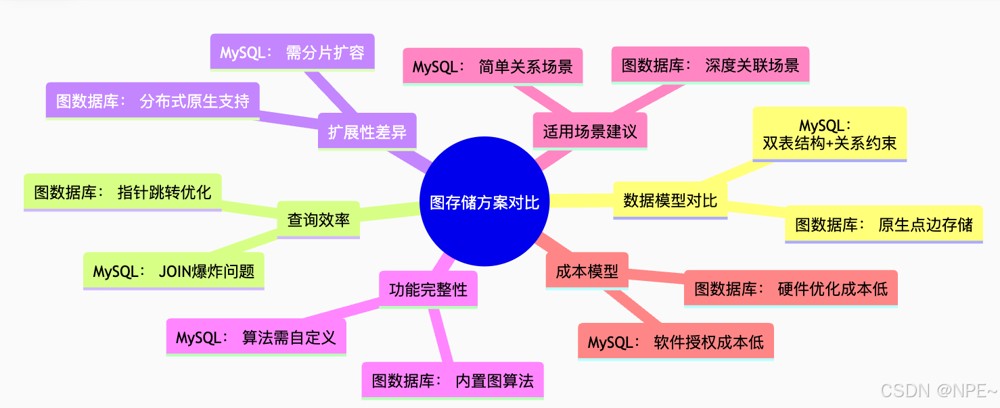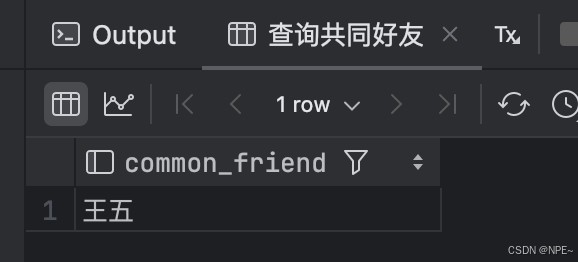一、概念
图数据库是一种用于存储和查询具有复杂关系的数据的数据库。在这种数据库中,数据被表示为节点(实体)和边(关系)。图数据库的核心优势在于能够快速地查询和处理节点之间的关系。
图数据库特点:
- 高效处理复杂关系:图数据库擅长处理复杂、多层级的关系,这使得它在社交网络分析、推荐系统等领域具有显著优势。
- 灵活的查询语言:图数据库通常使用类似自然语言的查询语言,如gremlin或cypher,使得查询过程更加直观。
但并非只有专业的图数据库可以实现图的一些操作,比如:图挖掘,实际也可以通过mysql来实现。本文主要讲解如何通过mysql构建图数据存储,当然mysql构建图结构数据与专业图数据库还是有能力上的差异,比如:图算法需要自己通过sql实现、整体效率不及专业图数据库等。

二、应用场景
基于mysql实现图数据库,是通过多表关联来实现操作,因此性能和整体能力肯定不及专业图数据库。
mysql实现图存储最适合场景:
- 中小规模图数据(≤10万节点)
- 需要强事务保证的业务系统
- 图查询以1-3度关系为主
- 已有mysql基础设施且预算有限
专业图数据库场景:
- 大规模图数据(≥100万节点)
- 需要复杂图算法(社区发现等)
- 深度路径查询(≥4度关系)
- 实时图分析需求
三、实现
环境搭建
首先我们需要有mysql环境,我这里为了方便就直接通过docker搭建mysql:
docker run -d \ --name mysql8 \ --restart always \ -p 3306:3306 \ -e tz=asia/shanghai \ -e mysql_root_password=123456 \ -v /users/ziyi2/docker-home/mysql/data:/var/lib/mysql \ mysql:8.0

存储结构定义
图主要包含节点、边,因此我们这里选择定义两个数据表来实现。同时节点和边都具有很多属性,且为kv对,这里我们就采用mysql中的json格式存储。
-- 节点表
create table if not exists node (
node_id bigint not null auto_increment primary key,
properties json comment '节点属性'
);
-- 边表
create table if not exists edge (
edge_id bigint not null auto_increment primary key,
source_id bigint not null comment '源节点id',
target_id bigint not null comment '目标节点id',
properties json comment '边属性',
foreign key(source_id) references node(node_id) on delete cascade,
foreign key(target_id) references node(node_id) on delete cascade
);
-- 索引创建
create index idx_edge_source on edge(source_id);
create index idx_edge_target on edge(target_id);
基础功能
创建
节点创建:
-- 创建用户节点
insert into node (properties) values
('{"type": "user", "name": "张三", "age": 28, "interests": ["篮球","音乐"]}'),
('{"type": "user", "name": "李四", "age": 32, "interests": ["电影","美食"]}'),
('{"type": "user", "name": "王五", "age": 27, "interests": ["跑步","美食"]}');
边创建:
-- 创建好友关系
insert into edge (source_id, target_id, properties) values
(1, 3, '{"type": "friend", "since": "2023-01-01"}'),
(2, 3, '{"type": "friend", "since": "2023-01-01"}');
查询
根据节点属性查询节点
select * from node where properties->>'$.name' = '张三';

查询某个节点关联的另一个节点
-- 查询张三的好友 select n2.node_id, n2.properties->>'$.name' as friend_name from edge e join node n1 on e.source_id = n1.node_id join node n2 on e.target_id = n2.node_id where n1.properties->>'$.name' = '张三' and e.properties->>'$.type' = 'friend';

查询两个节点的公共节点。查询共同好友,因为张三、王五是好友,李四、王五是好友,所以张三跟李四的共同好友就是王五
-- 查询共同好友 select n3.properties->>'$.name' as common_friend from edge e1 join edge e2 on e1.target_id = e2.target_id join node n1 on e1.source_id = n1.node_id join node n2 on e2.source_id = n2.node_id join node n3 on e1.target_id = n3.node_id where n1.properties->>'$.name' = '张三' and n2.properties->>'$.name' = '李四' and e1.properties->>'$.type' = 'friend' and e2.properties->>'$.type' = 'friend';

递归
查找某个节点关联的所有节点,类似与neo4j中的expand展开。
-- 递归查找所有关联节点
with recursive node_path as (
select
source_id,
target_id,
properties,
1 as depth
from edge
where source_id = 1
union all
select
np.source_id,
e.target_id,
e.properties,
np.depth + 1
from node_path np
join edge e on np.target_id = e.source_id
where np.depth < 5 -- 控制最大深度
)
select * from node_path;
效果:

更新
-- 更新节点已有属性值【更新完之后查询效果】 select * from node where properties->>'$.name' = '张三'; update node set properties = json_set(properties, '$.age', 29) where properties->>'$.name' = '张三'; -- 新增节点属性:添加新兴趣 update node set properties = json_array_append(properties, '$.interests', '游泳') where properties->>'$.name' = '张三'; select * from node where properties->>'$.name' = '张三';

删除
-- 删除关系 delete from edge where source_id = (select node_id from node where properties->>'$.name' = '张三') and target_id = (select node_id from node where properties->>'$.name' = '王五'); -- 删除节点及其关系 delete from node where properties->>'$.name' = '张三';
下面演示删除关系过程,删除节点同理:
1.删除之前
select * from edge where source_id = (select node_id from node where properties->>'$.name' = '张三') and target_id = (select node_id from node where properties->>'$.name' = '王五');

2. 执行sql删除后
-- 删除关系 delete from edge where source_id = (select node_id from node where properties->>'$.name' = '张三') and target_id = (select node_id from node where properties->>'$.name' = '王五');

图算法实现
1. 度中心性算法
度中心性算法(degree centrality)
- 介绍:中心性是刻画节点中心性的最直接度量指标。节点的度是指一个节点连接的边的数量,一个 节点的度越大就意味着这个节点的度中心性越高,该节点在网络中就越重要。对于有向图,还 要分别考虑出度/入度/出入度。
- 计算:统计节点连接的边数量。
- 应用:计算某个领域的kol关键人物,头部商家、用户、up主…
数据构造:
-- 删除之前数据,避免用户数据重复等
delete from edge;
delete from node;
alter table node auto_increment = 1;
alter table edge auto_increment = 1;
-- 创建用户节点
insert into node (properties) values
('{"type":"user","name":"张三","title":"科技博主"}'),
('{"type":"user","name":"李四","title":"美食达人"}'),
('{"type":"user","name":"王五","title":"旅行摄影师"}'),
('{"type":"user","name":"赵六","title":"投资专家"}'),
('{"type":"user","name":"钱七","title":"健身教练"}'),
('{"type":"user","name":"周八","title":"宠物博主"}'),
('{"type":"user","name":"吴九","title":"历史学者"}');
-- 创建关注关系
insert into edge (source_id, target_id, properties) values
-- 张三被关注关系
(2,1, '{"type":"follow","timestamp":"2023-01-10"}'),
(3,1, '{"type":"follow","timestamp":"2023-01-12"}'),
(4,1, '{"type":"follow","timestamp":"2023-01-15"}'),
(5,1, '{"type":"follow","timestamp":"2023-01-18"}'),
-- 李四被关注关系
(1,2, '{"type":"follow","timestamp":"2023-01-20"}'),
(3,2, '{"type":"follow","timestamp":"2023-01-22"}'),
(6,2, '{"type":"follow","timestamp":"2023-01-25"}'),
-- 王五被关注关系
(1,3, '{"type":"follow","timestamp":"2023-02-01"}'),
(7,3, '{"type":"follow","timestamp":"2023-02-05"}'),
-- 赵六被关注关系
(4,4, '{"type":"follow","timestamp":"2023-02-10"}'); -- 自关注(特殊情况)
度中心性算法实现:
-- 计算用户被关注度(入度中心性)
select
n.node_id,
n.properties->>'$.name' as user_name,
n.properties->>'$.title' as title,
count(e.edge_id) as follower_count,
-- 计算标准化中心性(0-1范围)
round(count(e.edge_id) / (select count(*)-1 from node where properties->>'$.type'='user'), 3) as normalized_centrality
from node n
left join edge e on n.node_id = e.target_id
and e.properties->>'$.type' = 'follow'
where n.properties->>'$.type' = 'user'
group by n.node_id
order by follower_count desc;
效果:

2. 相似度算法
图场景中相似度算法主流的主要包含:余弦相似度、杰卡德相似度。这里主要介绍下jaccard相似度算法。
- 杰卡德相似度(jaccard similarity)
- 介绍:节点a和节点b的杰卡德相似度定义为,节点a邻居和节点b邻居的交集节点数量除以并集节点 数量。jaccard系数计算的是两个节点的邻居集合的重合程度,以此来衡量两个节点的相似度。
- 计算:计算两个节点邻居集合的交集数量和并集数量,然后再相除。公式:|a ∩ b| / (|a| + |b| - |a ∩ b|)
- 应用:共同好友推荐、电商商品推荐猜你喜欢
数据构造:
-- 清理之前数据,避免混淆
delete from edge;
delete from node;
alter table node auto_increment = 1;
alter table edge auto_increment = 1;
-- 创建用户节点(包含风险标记)
insert into node (properties) values
('{"type":"user","name":"张三","phone":"13800138000","risk_score":5,"register_time":"2023-01-01"}'),
('{"type":"user","name":"李四","phone":"13900139000","risk_score":85,"register_time":"2023-01-05"}'), -- 黑产用户
('{"type":"user","name":"王五","phone":"13700137000","risk_score":92,"register_time":"2023-01-10"}'), -- 黑产用户
('{"type":"user","name":"赵六","phone":"13600136000","risk_score":15,"register_time":"2023-01-15"}'),
('{"type":"user","name":"钱七","phone":"13500135000","risk_score":8,"register_time":"2023-01-20"}'),
('{"type":"user","name":"孙八","phone":"13400134000","risk_score":95,"register_time":"2023-01-25"}'); -- 黑产用户
-- 创建设备节点
insert into node (properties) values
('{"type":"device","device_id":"d001","model":"iphone12","os":"ios14"}'),
('{"type":"device","device_id":"d002","model":"huaweip40","os":"android10"}'),
('{"type":"device","device_id":"d003","model":"xiaomi11","os":"android11"}'),
('{"type":"device","device_id":"d004","model":"opporeno5","os":"android11"}');
-- 创建银行卡节点
insert into node (properties) values
('{"type":"bank_card","card_no":"622588******1234","bank":"招商银行"}'),
('{"type":"bank_card","card_no":"622848******5678","bank":"农业银行"}'),
('{"type":"bank_card","card_no":"622700******9012","bank":"建设银行"}'),
('{"type":"bank_card","card_no":"622262******3456","bank":"交通银行"}');
-- 创建ip地址节点
insert into node (properties) values
('{"type":"ip","ip_address":"192.168.1.101","location":"广东深圳"}'),
('{"type":"ip","ip_address":"192.168.2.202","location":"浙江杭州"}'),
('{"type":"ip","ip_address":"192.168.3.303","location":"江苏南京"}'),
('{"type":"ip","ip_address":"192.168.4.404","location":"北京朝阳"}');
-- 创建关联关系
insert into edge (source_id, target_id, properties) values
-- 用户-设备关系
(1,7, '{"type":"use","first_time":"2023-01-01"}'), -- 张三使用d001
(2,7, '{"type":"use","first_time":"2023-01-05"}'), -- 李四使用d001
(2,8, '{"type":"use","first_time":"2023-01-06"}'), -- 李四使用d002
(3,8, '{"type":"use","first_time":"2023-01-10"}'), -- 王五使用d002
(3,9, '{"type":"use","first_time":"2023-01-11"}'), -- 王五使用d003
(4,10,'{"type":"use","first_time":"2023-01-15"}'), -- 赵六使用d004
(5,9, '{"type":"use","first_time":"2023-01-20"}'), -- 钱七使用d003
(6,7, '{"type":"use","first_time":"2023-01-25"}'), -- 孙八使用d001
-- 用户-银行卡关系
(1,11, '{"type":"bind","time":"2023-01-02"}'), -- 张三绑定银行卡1
(2,11, '{"type":"bind","time":"2023-01-05"}'), -- 李四绑定银行卡1
(2,12, '{"type":"bind","time":"2023-01-07"}'), -- 李四绑定银行卡2
(3,12, '{"type":"bind","time":"2023-01-11"}'), -- 王五绑定银行卡2
(3,13, '{"type":"bind","time":"2023-01-12"}'), -- 王五绑定银行卡3
(4,14, '{"type":"bind","time":"2023-01-16"}'), -- 赵六绑定银行卡4
(5,13, '{"type":"bind","time":"2023-01-21"}'), -- 钱七绑定银行卡3
(6,11, '{"type":"bind","time":"2023-01-26"}'), -- 孙八绑定银行卡1
-- 用户-ip关系
(1,15, '{"type":"login","time":"2023-01-03"}'), -- 张三登录ip1
(2,15, '{"type":"login","time":"2023-01-05"}'), -- 李四登录ip1
(2,16, '{"type":"login","time":"2023-01-08"}'), -- 李四登录ip2
(3,16, '{"type":"login","time":"2023-01-10"}'), -- 王五登录ip2
(3,17, '{"type":"login","time":"2023-01-13"}'), -- 王五登录ip3
(4,18, '{"type":"login","time":"2023-01-17"}'), -- 赵六登录ip4
(5,17, '{"type":"login","time":"2023-01-22"}'), -- 钱七登录ip3
(6,15, '{"type":"login","time":"2023-01-27"}'); -- 孙八登录ip1
算法实现:
jaccard相似度数学公式:|a ∩ b| / (|a| + |b| - |a ∩ b|)
-- 基于jaccard相似度的图相似度算法实现
with user_entities as (
select
u.node_id as user_id,
(
select json_arrayagg(ed.target_id)
from edge ed
where ed.source_id = u.node_id
and ed.properties->>'$.type' = 'use'
and ed.target_id in (select node_id from node where properties->>'$.type' = 'device')
) as devices,
(
select json_arrayagg(ec.target_id)
from edge ec
where ec.source_id = u.node_id
and ec.properties->>'$.type' = 'bind'
and ec.target_id in (select node_id from node where properties->>'$.type' = 'bank_card')
) as cards,
(
select json_arrayagg(ei.target_id)
from edge ei
where ei.source_id = u.node_id
and ei.properties->>'$.type' = 'login'
and ei.target_id in (select node_id from node where properties->>'$.type' = 'ip')
) as ips
from node u
where u.properties->>'$.type' = 'user'
),
-- 已知黑产用户
black_users as (
select node_id
from node
where properties->>'$.type' = 'user'
and cast(properties->>'$.risk_score' as unsigned) > 80
),
-- 相似度计算
similarity_calc as (
select
u1.user_id as target_user,
u2.user_id as black_user,
-- 设备相似度 (jaccard系数): |a ∩ b| / (|a| + |b| - |a ∩ b|)
case
when u1.devices is null or u2.devices is null
or json_length(u1.devices) = 0 or json_length(u2.devices) = 0
then 0
else (
-- 分子部分: |a ∩ b| (交集的大小)
select count(distinct d1.device_id)
from json_table(u1.devices, '$[*]' columns(device_id bigint path '$')) d1
inner join json_table(u2.devices, '$[*]' columns(device_id bigint path '$')) d2
on d1.device_id = d2.device_id
) * 1.0 / (
-- 分母部分: (|a| + |b| - |a ∩ b|) (并集的大小)
json_length(u1.devices) + -- |a| 集合a的大小
json_length(u2.devices) - -- |b| 集合b的大小
(
-- |a ∩ b| 交集的大小(再次计算用于分母)
select count(distinct d1.device_id)
from json_table(u1.devices, '$[*]' columns(device_id bigint path '$')) d1
inner join json_table(u2.devices, '$[*]' columns(device_id bigint path '$')) d2
on d1.device_id = d2.device_id
)
)
end as device_sim,
-- 银行卡相似度 (jaccard系数): |a ∩ b| / (|a| + |b| - |a ∩ b|)
case
when u1.cards is null or u2.cards is null
or json_length(u1.cards) = 0 or json_length(u2.cards) = 0
then 0
else (
-- 分子部分: |a ∩ b| (交集的大小)
select count(distinct c1.card_id)
from json_table(u1.cards, '$[*]' columns(card_id bigint path '$')) c1
inner join json_table(u2.cards, '$[*]' columns(card_id bigint path '$')) c2
on c1.card_id = c2.card_id
) * 1.0 / (
-- 分母部分: (|a| + |b| - |a ∩ b|) (并集的大小)
json_length(u1.cards) + -- |a| 集合a的大小
json_length(u2.cards) - -- |b| 集合b的大小
(
-- |a ∩ b| 交集的大小(再次计算用于分母)
select count(distinct c1.card_id)
from json_table(u1.cards, '$[*]' columns(card_id bigint path '$')) c1
inner join json_table(u2.cards, '$[*]' columns(card_id bigint path '$')) c2
on c1.card_id = c2.card_id
)
)
end as card_sim,
-- ip相似度 (jaccard系数): |a ∩ b| / (|a| + |b| - |a ∩ b|)
case
when u1.ips is null or u2.ips is null
or json_length(u1.ips) = 0 or json_length(u2.ips) = 0
then 0
else (
-- 分子部分: |a ∩ b| (交集的大小)
select count(distinct i1.ip_id)
from json_table(u1.ips, '$[*]' columns(ip_id bigint path '$')) i1
inner join json_table(u2.ips, '$[*]' columns(ip_id bigint path '$')) i2
on i1.ip_id = i2.ip_id
) * 1.0 / (
-- 分母部分: (|a| + |b| - |a ∩ b|) (并集的大小)
json_length(u1.ips) + -- |a| 集合a的大小
json_length(u2.ips) - -- |b| 集合b的大小
(
-- |a ∩ b| 交集的大小(再次计算用于分母)
select count(distinct i1.ip_id)
from json_table(u1.ips, '$[*]' columns(ip_id bigint path '$')) i1
inner join json_table(u2.ips, '$[*]' columns(ip_id bigint path '$')) i2
on i1.ip_id = i2.ip_id
)
)
end as ip_sim
from user_entities u1
join user_entities u2 on u2.user_id in (select node_id from black_users)
where u1.user_id not in (select node_id from black_users) -- 排除已知黑产
)
-- 最终结果查询
select
u.properties->>'$.name' as target_user,
u.properties->>'$.phone' as phone,
cast(u.properties->>'$.risk_score' as unsigned) as risk_score,
bu.properties->>'$.name' as black_user,
round(sc.device_sim, 3) as device_similarity,
round(sc.card_sim, 3) as card_similarity,
round(sc.ip_sim, 3) as ip_similarity,
round((sc.device_sim * 0.5 + sc.card_sim * 0.3 + sc.ip_sim * 0.2), 3) as total_similarity,
case
when (sc.device_sim * 0.5 + sc.card_sim * 0.3 + sc.ip_sim * 0.2) > 0.7 then '高风险'
when (sc.device_sim * 0.5 + sc.card_sim * 0.3 + sc.ip_sim * 0.2) > 0.4 then '中风险'
else '低风险'
end as risk_level
from similarity_calc sc
join node u on sc.target_user = u.node_id
join node bu on sc.black_user = bu.node_id
order by total_similarity desc
limit 5;
效果:

四、项目实战
基于mysql搭建的图数据库,模拟实现好友推荐功能。
数据准备:
-- 创建用户
insert into node (properties) values
('{"type":"user","name":"张三","age":25,"city":"北京"}'),
('{"type":"user","name":"李四","age":28,"city":"北京"}'),
('{"type":"user","name":"王五","age":30,"city":"上海"}'),
('{"type":"user","name":"赵六","age":26,"city":"广州"}'),
('{"type":"user","name":"钱七","age":27,"city":"深圳"}'),
('{"type":"user","name":"jack","age":18,"city":"杭州"}'),
('{"type":"user","name":"tom","age":45,"city":"贵州"}'),
('{"type":"user","name":"mike","age":35,"city":"上海"}');
-- 创建好友关系
insert into edge (source_id, target_id, properties) values
(1,2, '{"type":"friend"}'),
(1,3, '{"type":"friend"}'),
(2,4, '{"type":"friend"}'),
(3,5, '{"type":"friend"}'),
(4,5, '{"type":"friend"}'),
(6,7, '{"type":"friend"}'),
(7,8, '{"type":"friend"}');
具体实现
-- 综合推荐算法:为张三推荐3个好友,排除现有好友
with target_user as (
select
node_id,
properties->>'$.city' as city
from node
where properties->>'$.name' = '张三'
),
existing_friends as (
select target_id
from edge
where source_id = (select node_id from target_user)
and properties->>'$.type' = 'friend'
),
common_friends as (
select
f2.target_id as candidate_id,
count(*) as common_friend_count
from edge f1
join edge f2 on f1.target_id = f2.source_id
where f1.source_id = (select node_id from target_user)
and f2.target_id not in (select target_id from existing_friends) -- 排除现有好友
and f2.target_id != (select node_id from target_user) -- 排除自己
and f1.properties->>'$.type' = 'friend'
and f2.properties->>'$.type' = 'friend'
group by f2.target_id
),
same_city as (
select
n.node_id as candidate_id,
1 as same_city_score
from node n
where n.properties->>'$.city' = (select city from target_user)
and n.node_id != (select node_id from target_user)
and n.node_id not in (select target_id from existing_friends) -- 排除现有好友
),
final_candidates as (
select
cf.candidate_id,
coalesce(cf.common_friend_count, 0) as common_friends,
coalesce(sc.same_city_score, 0) as same_city,
coalesce(cf.common_friend_count, 0) * 0.6 +
coalesce(sc.same_city_score, 0) * 0.4 as recommendation_score
from common_friends cf
left join same_city sc on cf.candidate_id = sc.candidate_id
union all
select
sc.candidate_id,
0 as common_friends,
sc.same_city_score as same_city,
sc.same_city_score * 0.4 as recommendation_score
from same_city sc
where sc.candidate_id not in (select candidate_id from common_friends)
)
select
n.properties->>'$.name' as recommended_name,
fc.common_friends,
fc.same_city,
fc.recommendation_score
from final_candidates fc
join node n on fc.candidate_id = n.node_id
order by recommendation_score desc
limit 3;
效果展示
可以看到最后只给张三推荐了赵六和钱七,并没有推荐tom、jack等用户。

到此这篇关于基于mysql实现基础图数据库的详细步骤的文章就介绍到这了,更多相关mysql图数据库内容请搜索代码网以前的文章或继续浏览下面的相关文章希望大家以后多多支持代码网!






发表评论